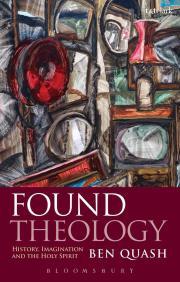This 'away-from-home-and-reading' bit of my sabbatical is coming to an end. I haven't read as much as I had wanted to, but there is also a life to be lived (and football to be watched).
Before finishing with a couple of funny German satirical books, I spent the last couple of days reading Ben Quash's Found Theology: History, Imagination and the Holy Spirit. I am very glad I did.

Last year I asked Ben to be (Honorary) Canon Theologian of Bradford Cathedral and he agreed. He is Professor of Christianity and the Arts at Kings College London and was formerly Dean and Fellow of Peterhouse in the University of Cambridge. Last summer I asked Ben to address my clergy on the subject of 'change' – given all the uncertainties about the future of the diocese in the light of proposals to dissolve three dioceses and create a single new one for West Yorkshire & the Dales (which, as we know, is soon to be a reality). In the morning he presented some of the material that is now set out in this book. (In the afternoon we had Pastor Sebastian Feydt from the Frauenkirche in Dresden, Germany, to talk about radical change and its effects – he had experienced the changes in Germany from GDR to FRG at every level, including how such change affects or shapes your theology.)
If Ben had told me beforehand that he would begin with a brief study of modal auxiliaries in English language, I would probably have advised against it on the grounds that … er … it doesn't sound very … er … likely to enthral the busy clergy mind. It was absolutely riveting. Since then, I have waited for the book and for the time to read it properly – even though some bits made me feel a bit dim and slow.
I am not going to attempt to review it here. Suffice to say that this beautifully written book ranges through language, translation, art, poetry, the naming of cats, Bible, text, hermeneutics, history, philosophy, christology and pneumatology. And, yes, that was 'the naming of cats'. I rarely read a 'theology' from cover to cover, but I did this one. Basically, he wants the reader to see that the Holy Spirit breathes through the space that engages our imagination (in its proper meanings), re-lighting the past and shaping the future. En route he has important things to say or suggest about how the church is to handle new phenomena in the light of a proper reading of and handling of scripture – something pertinent to current ethical debates in and beyond the church.
I quote the opening of the first chapter on 'Historical finding':
The theology advanced in this book understands ongoing history as a gift of the Holy Spirit, to relate us to God in Christ, and it is energetically opposed to models of doctrine that assume for it any sort of ahistorical completeness; that assume it to be a set of securely held propositions from which all necessary implications for Christian belief and practice can then be deduced in any time and place. (p.1)
 Posted with Blogsy
Posted with Blogsy
